
- Home
- Authenticity
- Material
- Origin
- Style
- 1940-1960 (143)
- Antiquity (50)
- Antiquité (301)
- Art Nouveau (12)
- Art Populaire (19)
- Directoire (31)
- Louis Philippe (56)
- Louis Xiii (33)
- Louis Xiv, Baroque (103)
- Louis Xvi (81)
- Moyen-âge (61)
- Napoleon Iii (38)
- Napoléon Iii (423)
- Napoléon, Empire (75)
- Ottoman (28)
- Renaissance (90)
- Restauration (32)
- Rustique (17)
- 1900 (22)
- 1970 (26)
- Other (2372)
- Sub-type
- Type
Sgabello Escabelle Italy 18th Century
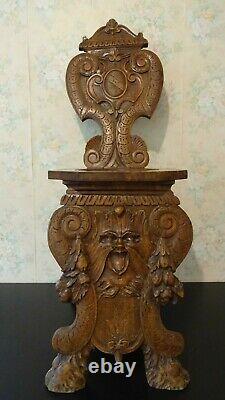
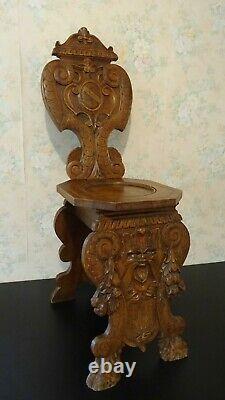
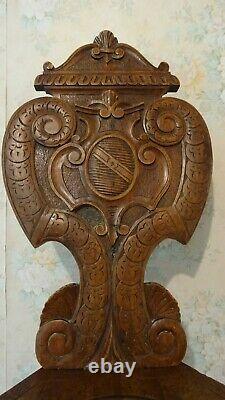
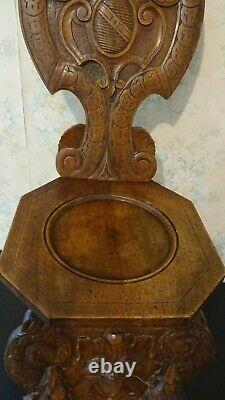
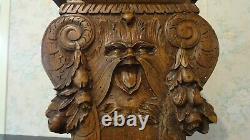
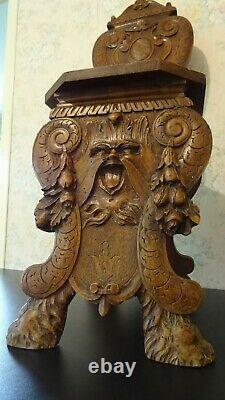

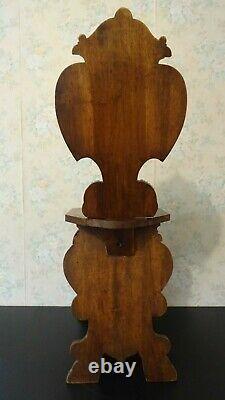


Beautiful sgabello Italy xvii - 18th century. This sgabello is Italian and dates from the 17th or 18th century. We notice the presence of stylized lilies; the lily of florence \"il giglio\" being the coat of arms of the city since the 19th century, it is a Florentine raid. In walnut, and entirely sculpted, this antique looks much more like a sculpture and a work of art than a chair and a piece of furniture. The term \"sgabello\" or \"sgabelli\" comes from \"scanno\" which means stools. These chairs were held against the walls. This use explains, from the side, the sobriety of the lines. The deeply carved surfaces remind us of the time when, at night, the interior of the houses was illuminated only by natural light emitted by a burning fire or lit candles.
This type of light casts dramatic shadows and lends itself beautifully to sculptural art. The patterns, placed symmetrically, the volutes, the frills, coexist in a harmonious general balance, thus recalling the best of Italian design. These typical chairs have been historically found, in the Italian palaces of important aristocratic families, and more precisely in the entrance halls.
An emblem of a powerful family with a well-furnished interior, it is both a demonstration of wealth and a short resting place. This sgabello is simply sublime in many ways, and above all beautifully harmonious. The base has two volute supports, with acanthus leaves and flowers, symbol of eternal love. All on the feet of a chimera. With frieze at the top and florence lilies at the bottom, the frame is thus given to the mascaron. This mask, a frightening human figure, has an apotropaic function: it keeps evil spirits away so that they do not enter the house.The seat, sober, opened in a circle, is octagonal. It should be noted that this is the classical form, ranging from the end of the Renaissance to the beginning of Baroque art, that is to say at the beginning of the 18th century. The top back is removable. Two new volute supports are there, closed on themselves at the bottom. A reminder of the top frieze, which this time gives the frame to a cartridge to the family coat of arms.
These coats of arms are unidentified. On the pediment: lilies of florence on a stylized crown, symbolizing power and victory. Magnificent sgabello italy xvii - xviii century. This sgabello is italian and dates from the 17th or 18th century. We notice the presence of stylized lilies; the lily of florence \"il giglio\" being the coat of arms of the city since the eleventh century, it is a Florentine raid.
In walnut, and entirely carved, this antique is much more like a sculpture and a work of art than a chair and a piece of furniture. The term \"sgabello\" or \"sgabelli\" comes from \"scanno\" which means stool. These chairs were held against the walls. This use explains, when seen from the side, the sobriety of the lines.The deeply sculpted surfaces remind us of the time, when at night, the interior of the houses was lit only by natural light emitted by a blazing fire or burning candles. This type of light casts dramatic shadows, and lends itself beautifully to sculptural art. The patterns, symmetrically placed, the volutes, the flourishes, coexist in a harmonious general balance, thus reminding us of the best of Italian design. These typical chairs were historically found, in the Italian palaces of important aristocratic families, and more precisely in the entrance halls.
The emblem of a powerful family with a well-furnished interior, it is both a demonstration of wealth and a short resting place. This sgabello is simply sublime in many ways, and above all beautifully harmonious. The base features two scrolled supports, with acanthus leaves and flowers, a symbol of eternal love.
All on the feet of a chimera. With frieze at the top and lily of florence at the bottom, the frame is thus given to the mascaron. This mask, a frightening human figure, has an apotropaic function: it keeps evil spirits away so that they do not enter the house. The seat, sober, openwork of a circle, is octagonal.
It should be noted that this is the classical form, ranging from the end of the renaissance to the beginning of baroque art, i. The beginning of the 17th century. The high backrest is removable; it is securely mortised in the seat and pegged under the seat. Two new scrolled supports are there, closed on themselves at the bottom.
Reminder of the frieze at the top, which this time gives the frame to a cartridge with the family coat of arms. These coats of arms are not identified. On the pediment: florence lily on a stylized crown, symbolizing power and victory. The item \"sgabello escabelle italy xvii 18th century\" has been on sale since Sunday, October 25, 2020.
It is in the category \"art, antiques and objects of the 19th and before\". The seller is \"ptiteflower17\" and is located at/in goulles.This item can be delivered anywhere in the world.
- origin: Italy
- subs-type: unspecified
- modified object: no
- matter: wood
- type: popular art object
- authenticity: original
- style: rebirth

